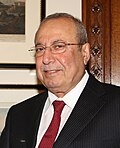A request that this article title be changed to Prime Minister of the Kurdistan Region is under discussion . Please do not move this article until the discussion is closed. |
| Prime Minister of the Kurdistan Region | |
|---|---|
 Political Emblem | |
| Appointer | Kurdistan Region Parliament |
| Term length | Four years, renewable |
| Inaugural holder | Fuad Masum (de facto) Nechirvan Barzani (de jure) |
| Formation | 4 July 1992 (de facto) 1 March 2006 (de jure) |
| Website | www |
The Prime Minister of the Kurdistan Region is the head of the Kurdistan Regional Government, governing semi-autonomous Kurdistan Region in northern Iraq. The government is elected as part of the Kurdistan Region Parliament. [1]









